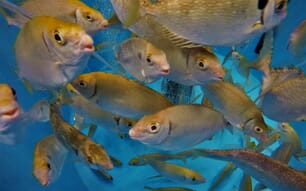Zheng Hongbing, a fish farmer in the city's suburban Qingpu District, known as Shanghai's land of rivers and lakes, filled his pond at Xinyang Village with water from nearby Xinyang Creek on 25 April.
But a month later, he stated that the water level had dropped by 40 per cent, from two meters to 1.2 meters, as the city experienced its lowest rainfall figure for the start of a year since 1873.
Usually, water resources should be sufficient in this period of the year and not drop by more than 0.2 meters in one month, Mr Zheng told the Shanghai Youth Daily.
If the drought continues, Mr Zheng will have to pump water into the pond from Xinyang Creek again, which means another round of disinfection and more expense on electricity.
"The more frequently I pump water the more slowly the fish grow," Mr Zheng complained.
"And it costs me more disinfectant and power," he told the newspaper.
The effect of the drought has also appeared in Jinze Town in the district, only 10 kilometers from the Dianshan Lake.
"It's been hard to find rice-field eels in the ponds recently," said an old fisherman. "It's unclear whether the eels were all fished or have gone because of the drought."
Although ponds were all filled with water in the town, fish farmers were concerned about the prolonged drought in the Yangtze River region.
"Seasonal weather is very important for aquaculture," said Zhu Lingen, a fish farmer and dealer in the town.
"Even if a pond has enough water, the fish may not grow well because of the abnormal weather," Mr Zhu said.
Mr Zhu said his fish did not have a good appetite this year. For weeks they have only consumed three sacks of fish feed per day, while the number should be five.
"I'm really worried about this year's fishery," Mr Zhu said.
However, the Shanghai Aquaculture Industry Association is less concerned, saying that the city can look to other sources if necessary.
An official, surnamed Fan, said that in the city's aquaculture market, 55 per cent was seafood and that most freshwater stock for Shanghai comes from Zhejiang, Jiangsu, Guangdong, Anhui and Hubei provinces.
Fish Farmers Hit By Drought
CHINA - Fish farmers are struggling as the production of freshwater species has been hit by the ongoing drought in the middle and lower reaches of the Yangtze River region, Shanghai Dailyreports.




